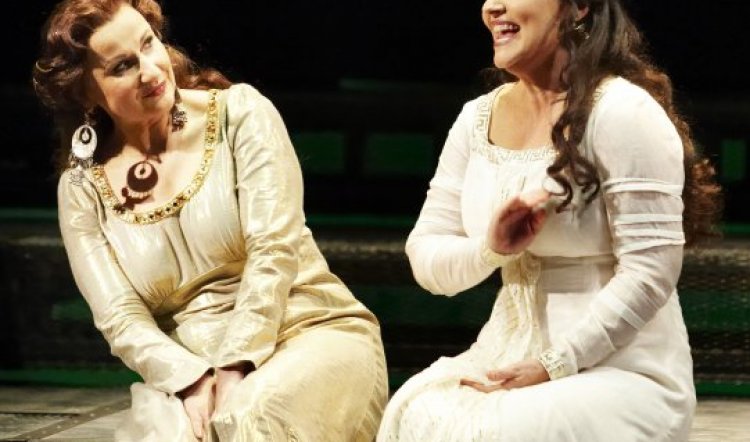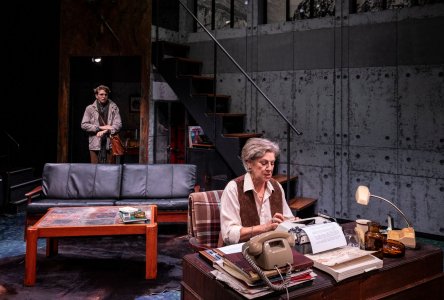
THE LOVE OF THE NIGHTINGALE
THE LOVE OF THE NIGHTINGALE, Opera Australia co-production with Perth International Arts Festival, WA Opera, Queensland Music Festival, QPAC and Victorian Opera. Sydney Opera House; 21 October-1 November 2011. Photos: Keith Saunders; Anke Hðppner and Emma Matthews, right: Emma Matthews.
"When a man with power smiles, all is well," says one of the wise women in Timberlake Wertenbaker's libretto – a reinvention of her own 1989 stage play. The ancient Greek myth of the nightingale – Philomele – is drawn from Ovid's Metamorphoses, and tells of the rape of the virgin Philomele by her brother-in-law Tereus. Best known in Australia for her play Our Country's Good, Wertenbaker is prolific. She's also a playwright whose feminism is attuned to this exploration of the links between men and women, power and violence, dark and light. She has a marvelously empathic musical partner in composer-conductor Richard Mills. The result is the "new" Australian opera I've been waiting for since Batavia – the brilliant collaboration between him and director Lindy Hume.
Currently artistic director of the Sydney Festival, Hume commissioned The Love of the Nightingale for the Perth Festival when she was its artistic director. The multi-award winning production was one of the 2007 Perth highlights and has since been seen in Brisbane and Melbourne; finally arriving in Sydney as a new staging. However, the Helpmann-winning star of the world premiere production – Emma Matthews – reprises the title role. And also retained from Perth is the powerful Anke Hðppner as her sister Procne and the stylish setting. This consists of a series of rolling platforms and verticals; they are backed by projections that add colour and atmosphere to the stark structures (designer Dan Potra) along with Nigel Levings' expressive lighting. Now under the direction of Tama Matheson, the opera is a scorching experience and it's easy to see why it won four Helpmanns (as well as Matthews, they were: best male and female supporting performer for James Eggleston and Orla Boylan and best musical direction for Richard Mills).
The Love of the Nightingale opens in musical dissonance and war as Tereus of Thrace (Richard Anderson) liberates Athens. As a reward the grateful King Pandion (Andrew Brunsdon) offers Tereus any gift of his choosing; the victor sees the king's daughters and chooses the eldest, Procne (Hðppner), as his gift and wife. Five years on and Procne has a young son but is still lonely for her sister and Athens. Thrace is a chilly and unfriendly place, while the Thracian women – represented by Sharon Prero, Natalie Jones, Annabelle Chaffey, Anna Yun and Dominica Matthews – see Procne as a standoffish interloper; not the sort to do lunch.
Procne persuades Tereus to go back to Athens to bring Philomele for a visit – despite the ill-expressed misgivings of the women (some solidarity at last). In Athens, King Pandion treats his visiting son-in-law to a performance of The Tragedy of Phaedra and Hippolytus, during which Tereus outrages the goddess Aphrodite. As a consequence he falls in love with Philomele; on the return voyage to Thrace, however, she is clearly falling for the young ship's captain (David Corcoran) which effectively signs his death warrant. Refusing his advances, reminding him of the incest taboo, Tereus tells her Procne is dead. Still Philomele rebuffs him and is savagely raped and abandoned on an isolated beach with her serving woman Niobe (Elizabeth Campbell).
Meanwhile, in Thrace, Procne's instincts tell her all is not well and her fears are confirmed when Tereus arrives without Philomele. He says she died on the voyage and her body is lost; he is not a powerful man for nothing. He returns to the unlawful object of his desire and she repudiates him – she can smell her sister on him and knows he lied in saying she was dead. Angry and mad with grief, Phlomele rashly reminds Tereus that he was unable to take her virginity and instead ruptured her hymen with a knife; she warns him that her sister will learn of his treachery and impotence. To prevent it he cuts out her tongue, kisses her, telling her that she is "My sweet, my songless, my caged bird," and abandons her once more.
The end of The Love of the Nightingale is brutal revenge followed by fantastical metamorphoses and redemption. Philomele is finally able to find her sister and demonstrate, with the puppet figures she has crafted, what happened to her. Procne and the women are performing the ritual dance of the Bacchae and they are captivated by the awful realization and their own desire for retribution. They kill Tereus's young son to halt the next generation of male power and barbarism. Procne reveals Philomele to her husband and also the battered body of their child. Aphrodite too has her revenge. Tereus and the sisters are transformed into birds. Philomele – the nightingale – sings a wordless benediction that soars through pain and grief into a promise of peace and forgiveness and some kind of eternity. The end.

In the program notes for the opera's world premiere season, Wertenbaker wrote: "Where does violence come from? I cannot answer this but I feel instinctively that it has to do with being silenced. The pen is mightier than the sword goes the old expression, yes, but it should be added that those who cannot use a pen will use a sword instead." And in The Love of the Nightingale the symbolism of powerful men and powerless women has no more terrible achievement than the "silencing" of Philomele; and Tereus's easy resort to violence and terror.
Similarly, Hume wrote, in her notes for that first production: "The message that the 3000-year-old myth of Philomele, Procne and Tereus carries from the ancient world to audiences in Australia in 2007 is that the power of words, the use of words – and particularly the ability to ask questions – is both a human right and a human responsibility." Exactly the same can be said of Australia in 2011, with, for instance, the right to question and speak out in the "Occupy" demonstrations being violently usurped by the police and state governments.
The Love of the Nightingale is surprisingly and judiciously leavened with bright spots of knowing humour. The effect is to slightly undercut the archaic horrors on stage while jolting one's thoughts to consider the similar but different horrors of contemporary society. At the same time, the score's passages of lyrical beauty underline and highlight the hope and love of (some) of the humans; while the orchestra is virtually another character in the work, one whose emotions of jagged dissonance, grief and anger are palpable.
The cast is fine, yet first among equals is Emma Matthews returning to the role of the tragic young heroine with four years more control, timbre, vocal and dramatic experience and sheer beauty in her voice. We knew she was good in 2007, on opening night in Sydney she was simply superb. She acted convincingly: the personification of innocence, then innocence despoiled, then a girl becoming a woman through the most ghastly circumstances. And finally, she became the nightingale in Richard Mills's exquisite vocalise.
It's a risky undertaking for both composer and singer: the weight of expectation is immense at this climactic moment. Can he really write a song for a nightingale? Can the soprano really pull it off? As Matthews stood centre stage and began the wordless melody the house fell silent. Not a cough, not a rattle, not a shuffle. Gracefully, effortlessly, like the little bird itself, her voice flew, twirled, fluted and spun upwards in the most diaphanous of melodies. It was a perfect evocation, a perfect moment, a perfect rendition and finally the human voice slipped seamlessly into a real nightingale's recorded song. Redemption indeed.



